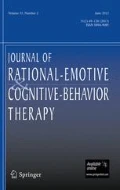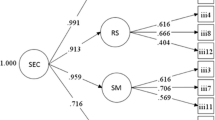Abstract
The present study investigated the effects of the Let's Get Rational board game on rational thinking, depression, and self-acceptance in high school students. A sample of 80 subjects (40 male, 40 female) was selected for participation in this study. Four experimental groups of 10 students played the board game Let's Get Rational for one 52 minute class period once a week for seven weeks. Three dependent measures were used. These included a measure of rational thinking (Child and Adolescent Scale of Irrationality), a measure of depression (Beck Depression Inventory), and a measure of self-acceptance (Adjective Generation Technique). Cell means were calculated for the following independent variables: 1) treatment vs. no treatment, 2) gender—male vs. female, and 3) grade level—9th, 10th, 11th, and 12th. Results indicated that the subjects in the experimental group agreed with fewer irrational beliefs than subjects who received no treatment. Ninth grade experimental subjects reported less irrational thinking than did 9th-grade control group subjects. Finally, 10th-grade experimental subjects were significantly less depressed than 10th-grade control subjects.
Similar content being viewed by others
References
Allen, B., & Potkay, C. (1973). The adjective generation technique: An alternative to adjective checklists.Psychological Reports, 32, 457–458.
Beck, A., & Steer, R. (1979).Beck depression inventory manual. San Antonio, TX: The Psychological Corporation.
Bedford, S. (1974)Instant replay. New York: Institute for Rational-Emotive Therapy.
Bernard, M., & Laws, W. (1988, June).Childhood irrationality and mental health: Development of a scale. Paper presented at the 24th International Congress of Psychology, Sydney, Australia.
DiGiuseppe, R., & Kassinove, H. (1976). Effects of a rational-emotive school mental health program in children's emotional adjustment.Journal of Community Psychology, 4, 382–387.
Ellis, A. (1962).Reason and emotion in psychotherapy. Secaucus, NJ: Citadel Press.
Loomis, E. (1957). The use of checkers in handling certain resistances in child therapy.Journal of American Psychoanalytic Association, 5, 130–135.
Mead, G. (1934).Mind, self, and society. Chicago: University of Chicago.
Ribowitz, A. (1979).Effects of “abc” homework sheets, initial level of adjustment, and duration of treatment on the efficacy of rational-emotive education in elementary school children. Unpublished doctoral dissertation, Hofstra University.
Schaefer, C., & Reid, S. (1986).Game play: Therapeutic use of childhood games New York: Wiley.
Shapiro, L. (1992).Childswork/childsplay fall catalog. King of Prussia, PA: Center for Applied Psychology.
Sutton-Smith, B., & Roberts, J. (1971). The cross cultural and psychological study of games,International Review of Sports Sociology, 6, 79–87.
Teri, L. (1982). The use of the Beck depression inventory with adolescents.Journal of Abnormal Child Psychology, 10, 277–284.
Wasserman, T. & Vogrin, D. (1979). Relationship of endorsement of rational beliefs, age, months of treatment and intelligence of overt behavior of emotionally disturbed children.Psychological Reports, 44, 911–917.
Wilde, J. (1992).Rational counseling with school aged populations: A practical guide. Muncie, IN: Accelerated Development.
Zakich, R. (1975)The ungame, Anaheim, CA: The Ungame Company.
Zitman, S. (1984).The rational emotive game. Unpublished manuscript. Wright State University, Dayton.
Author information
Authors and Affiliations
Rights and permissions
About this article
Cite this article
Wilde, J. The effects of the Let's Get Rational board game on rational thinking, depression, and self-acceptance in adolescents. J Rational-Emot Cognitive-Behav Ther 12, 189–196 (1994). https://doi.org/10.1007/BF02354596
Issue Date:
DOI: https://doi.org/10.1007/BF02354596




